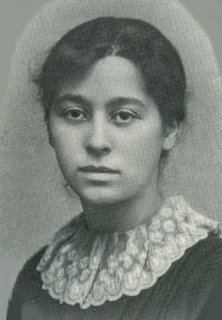
I've recently discovered Amy Levy. She's a late Victorian writer who, since about 1990, has been undergoing a rediscovery. She wrote three novels before her death-by-suicide in 1889.
Reuben Sachs is generally considered her greatest work, a study of Anglo-Jewish life in 1880s London. The book is only a little over 100 pages (not including commentary by scholars; another of her three "novels" is barely 60 pages, so it's really not a novel).
Aside from being Jewish, Levy was a feminist, reputedly a lesbian, a friend of such notables as Oscar Wilde, plus she committed suicide at the young age of 27. (The ideal death age to assure an artist's immortality: Kurt Cobain, Jimi Hendrix, Janis Joplin, Jim Morrison, Brian Jones.)
So then why was Levy unknown and out of print for so long? Some theorize that Jews were offended by Levy's
Reuben Sachs, which painted a critical picture of what Levy regarded as the materialism and sexism of Jewish culture.
It's an interesting work, thoughtful and moving and depressing. I suppose to some extent it's because we know the author eventually killed herself. Perhaps for no rational reason, suicide lends "authenticity" to an artist's work, imbuing her work with a pain that reaches across time. Knowing Levy's novels and life story, we wish we could have met and talked with her.
I seem to be on a Victorian binge. Just before
Reuben Sachs, I read G.K. Chesterton's
The Man Who Was Thursday. Some sharp satirical dialog -- and often insightful -- in what is sometimes called a spy thriller, but is really an absurdist comedy that grows into a Christian allegory. (And since it was published in 1908, it's really Edwardian rather than Victorian.) Chesterton tries to surprise, but as the novel progressed, I saw the twists coming. Even so, its humor and insight makes it worth sticking with to the end.
Then there is George Gissing's
New Grub Street. Every writer should read this tale of the 1880s London literary scene. It seems the writer's life in 2007 is very much like that in the 1880s. There's even talk of how modern technology will revolutionize publishing paradigms and liberate authors. In our case, it's publishing-on-demand and the internet; in
New Grub Street it's the telegraph, which will supposedly liberate authors from publishers by granting authors independent access to foreign markets. Didn't happen then, not happening now.
New Grub Street is some 560 pages, but I couldn't put it down. Its has literary scams, writers block, sleazy "agents" selling services to authors, struggling artists, cynical hacks, authors who lament readers' shrinking attentions spans, rejection slips, low pay, one author who's stricken with cataracts, another who must rush into a burning building to save the only copy of his recently completed novel, and much else. Plus, a large cast of memorable characters and exciting storylines (at least to other authors; I suppose few readers care that much about whether this or that character will get a rejection slip).
I highly recommend all three of the above books.
 Kurt Vonnegut has died at 84.
Kurt Vonnegut has died at 84.